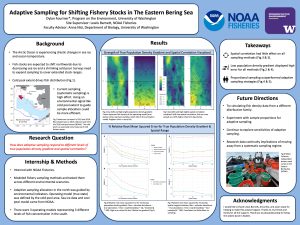Adaptive Sampling Strategies to Capture Shifting Fishery Stocks in the Eastern Bering Sea
Shifting fishery stocks in the Eastern Bering Sea have implications for fisheries management, infrastructure, and native subsistence in Alaska. They also give us the opportunity to rethink historical fishery practices and see if new methods may work better in the future. Sampling is one such practice that will need to adapt to accommodate shifting stocks. Current Eastern Bering Sea sampling involves a fixed grid of points that are sampled during surveys. However, as it becomes more pressing to expand the grid, it may be more efficient to utilize other sampling methods. Stratified random sampling could reduce the number of sample locations needed without affecting statistical products, and using environmental covariables to guide sample allocation could reduce effort in years where fish aren’t found in their new ranges. Knowing how a sampling regime will respond to environmental conditions is an integral part of implementing a new system. Fisheries managers want to be sure that they are mitigating risk when implementing new practices. For my research, I examined stratified random sampling with point allocation guided by sea ice extent using spatial modeling with the sdmtTMB package in R Studio. The adaptive sampling method was tested for its sensitivity to different levels of spatial correlation, strength of the underlying density gradient, and observer bias using simulation testing. I found that the adaptive sampling method was fairly consistent across a number of environmental scenarios which bodes well for its case as a suitable sampling method in the Eastern Bering Sea.
